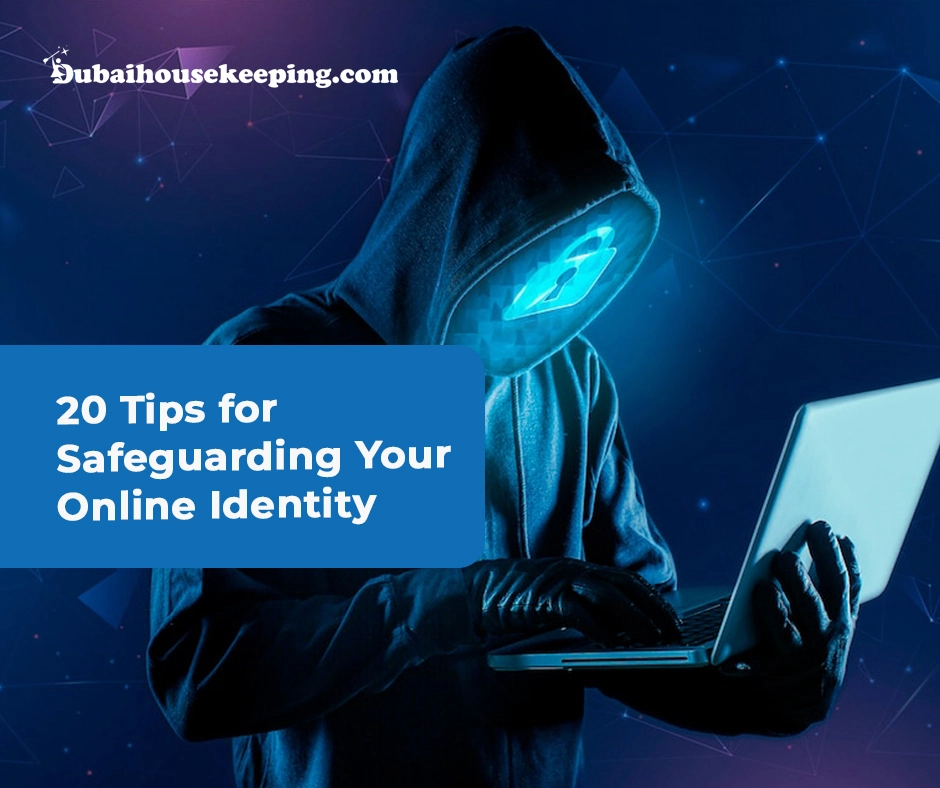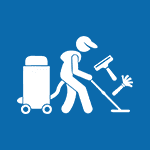With the much-anticipated GITEX event ongoing in Dubai, residents and visitors to Dubai can seize the wealth of opportunities this city offers. However, amidst your busy schedules and bustling activities, allow us to help you make the most of your time. At Dubai Housekeeping, we understand the significance of a clean and organized home. Our professional home cleaning services in Dubai cater to your specific needs, ensuring your living space remains pristine while you focus on the exciting prospects the event has to offer. Let us take care of your home, so you can wholeheartedly embrace the remarkable experience of GITEX.
With the rise of the technology & internet, we have also witnessed an increase in cybercrime. Every day, cyber criminals are coming up with sophisticated methods to acquire our personal data. In the worst-case scenario, hackers can use our data to commit identity theft. Therefore, it’s crucial that we take steps to safeguard our online identity.
In this post, we have compiled a list of 20 tips to protect your online identity while enjoying the advanced technology & gadgets. We will cover different areas of concern and provide you with practical solutions to keep your data safe. In a world where we spend most of our time online, it’s important to take proactive measures to ensure that our data is secure.
So without further ado, let’s dive into the first tip.
Passwords
Passwords are the first line of defense against hackers. It is crucial to create complex passwords that are not easy to guess. Never reuse your passwords on multiple accounts, as it makes it easier for hackers to access everything. Using a password manager can be helpful in generating and storing complex passwords. There are many options available, such as LastPass and 1Password. However, don’t forget that you can still write down your passwords on a piece of paper or store them in a secure location offline. Remember, the best password is one that is easy to remember for you but impossible for others to guess. So, create strong passwords and keep your accounts safe!
Two-factor authentication
Two-factor authentication is an essential step towards keeping your online identity safe. By enabling it for your email and cloud services, you add an extra layer of protection to your account. Use trusted devices to avoid any security lapses, and don’t share the codes with anyone. Two-factor authentication comes in handy when you realize that someone is attempting to hack your account. It prevents them from gaining access to it even if they have your password. Setting it up takes a few minutes, but it’s worth it. No more sleepless nights worrying about your account being hacked. Just make sure you don’t misplace your phone; otherwise, you might need to go through a lengthy process of account recovery.
Antivirus software
Antivirus software is a crucial line of defense against cyber-attacks. Installing a good antivirus software, keeping it updated, and running regular scans are the key steps to ensure maximum protection. However, note that antivirus software is not foolproof, and it may not detect new viruses right away. So, exercise caution when opening emails or downloading files from unverified sources.
Also, keep in mind that antivirus software is just part of the security solution. You should still be vigilant and take other measures to safeguard your online identity. For instance, avoid public WiFi or use encryption software if you have to connect to public networks. Additionally, be wary of social media invitations from strangers, and don’t share sensitive information on those platforms.
Remember, a comprehensive online protection strategy requires multiple layers of security. Antivirus software is just one of those layers. Take all necessary precautions and stay safe online.
Be wary of public WiFi
Using public WiFi networks can be dangerous, as cybercriminals snooping on these networks can easily intercept your data. To stay secure, use encryption software, which scrambles your data so that it can’t be read by prying eyes. However, don’t engage in activities such as banking online on public WiFi, as this means that sensitive information such as passwords and banking details can be easily stolen. Always ensure that you use trusted devices when accessing sensitive information or conducting transactions online.
Public WiFi is risky, so being aware of the dangers when using it is important. With simple precautions like not banking online and using encryption software, you can protect your sensitive data from prying eyes.
Social media
Social media has become an integral part of our daily lives, and it’s easy to forget that oversharing personal information can lead to identity theft. Be cautious about who you connect with online and think twice before sharing too much information. Locking down your Facebook account is crucial, as it can help to restrict who sees your posts, pictures and personal details. Consider using the privacy filters on your social media accounts, as they allow you to control who can access your information. It is also a good idea to limit location sharing to your close friends and family. Remember that everything you post online can be used against you, so it’s essential to be mindful of the information you share. Social media is a great way to stay connected with friends and family, but it’s important to use it wisely and keep your personal information secure.
Auction sites
Auction sites are magnets for hackers looking to steal information and money. But that doesn’t mean you should steer clear of them altogether. Instead, take caution and exercise vigilance when shopping online. Always check seller feedback before making a purchase and be wary of deals that seem too good to be true. To further protect your online identity, consider setting up a separate payment account for these sites. This limits the potential fraud risk even further by keeping your bank account or credit card information secure. Remember, a little bit of caution can go a long way in protecting your personal data and finances online.
Device security
Keep your phones and tablets locked just like you would your front door. Although it might seem like a hassle to key in a password or code 40-plus times a day, it’s your first line of defense. Next-generation devices are set to employ fingerprint scanning technology as additional security. The use of this technology might give the impression that such devices cannot be hacked. However, it’s best to ensure your devices are always locked and secure. Even the most secure technology can be prone to exploit if not adequately protected. So make sure to keep your devices locked and employ the latest security technology such as fingerprint scanning.
Also read, The Importance of Trust and Security in Professional Maid Services
Email accounts
mail accounts are the keys to our virtual kingdom and need to be protected. One key point to remember is never reusing your email password. Hackers who gain access to your email password will have access to all other accounts linked to it. Therefore, it is important to use different passwords for different accounts and not something predictable. Another important step is to lock down email accounts. This can involve setting up two-factor authentication, regularly changing the password, and monitoring the account for suspicious activity. Remember, emails contain a lot of personal data that can be used for identity theft, so it’s crucial to take steps in securing them.
Data encryption
Data encryption is a crucial part of safeguarding your online identity. Using encryption software ensures that your sensitive information remains protected from prying eyes. Don’t limit encryption to just your computer–consider using it on your phone and tablet devices as well. By encrypting your sensitive data, you add an extra layer of protection against hackers who are looking to steal your information. Regularly backing up your data is equally vital, as malware and computer crashes can wipe out all your data in seconds. Don’t be caught unprepared–keep backups of your critical data at all times. Remember, even the most robust security measures can be compromised in today’s world, so it’s best to stay vigilant at all times.
Recently, a famous local newspaper, Khaleej Times published an article highlighting various methods used by fraudsters in misleading victims. It is important that such awareness is raised & information shared. Here are the highlights.
Online Purchase Scams
The world of e-commerce is a breeding ground for scammers. They frequently impersonate legitimate sellers on online marketplaces, offering incredible deals on products that may either not exist at all or are not as advertised. The result is that unsuspecting buyers pay for goods that never arrive.
Staying Safe:
When shopping online, exercise caution and opt for well-established sellers. Use secure payment methods and conduct thorough research on the authenticity of the seller and their products. If a deal seems too good to be true, it probably is.
Banking Scams
In the realm of financial transactions, scam artists are known to impersonate bank officials or even government agencies. They skillfully deceive individuals into divulging personal or financial information, which they subsequently exploit for fraudulent activities.
Staying Safe: Adopt a firm policy of never sharing sensitive information over the phone or online, unless you have initiated the contact. Always verify the identity of the caller or sender and promptly report any suspicious communication to the appropriate authorities.
Job Offer Frauds
Fraudulent job offers have become increasingly prevalent. Victims may either pay for fictitious job placements or even travel to Dubai only to discover that the promised job does not exist.
Staying Safe: Engage in meticulous research on both the potential employer and the job offer. Be wary of positions that require an upfront payment. To validate the legitimacy of a job, contact official government agencies.
Rental Scams
In the world of real estate, rental scams are a grave concern. Unscrupulous individuals may advertise rental properties, collect deposits, and subsequently vanish, leaving their victims without accommodation.
Staying Safe: Whenever dealing with property rentals, it is imperative to work exclusively with registered real estate agents or reputable landlords. Carefully scrutinize all aspects of the property’s details and documentation, and ensure that a legally binding contract is in place.
Prize Scams
Scam messages or phone calls often inform victims that they have won a prize or a lottery, but to claim their winnings, they are required to pay a fee.
Staying Safe: Be exceedingly cautious when receiving unsolicited prize notifications. In reality, legitimate lotteries do not necessitate any fees for claiming prizes. It is crucial to verify the source of such messages and report any suspicious communications.
Dubai is renowned as a safe and welcoming city, and while it undoubtedly offers boundless opportunities, it is not immune to the wiles of fraudsters aiming to exploit residents and visitors. To maintain your security and peace of mind, it is crucial to stay informed about these prevalent scams and to exercise caution when conducting any financial or contractual transactions. By vigilantly verifying the authenticity of offers, utilizing only trusted sources for financial dealings, and promptly reporting any suspicious activity to the Dubai Police, you can comfortably enjoy all the offerings of Dubai with the assurance of your safety and security.












